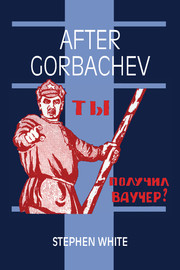Book contents
6 - The Soviet Union and the wider world
Published online by Cambridge University Press: 05 June 2012
Summary
For a country of its size and population, the Soviet Union had often appeared rather isolated from the affairs of other members of the world community. In part, at least, this reflected the influence of Russian history and of the political tradition that derived from it. With its broad and open frontiers, Russia is a country that has been invaded and occupied many times by outside powers. Foreigners, since the earliest times, have been required to live in special residential areas and have been treated with a good deal of suspicion and hostility by ordinary Russians as well as by government officials. Russian nationalism, an official ideology in the late Tsarist period and still very strong today, helped to create an attitude towards the West which combined an admiration for its prosperity and efficiency with a deep contempt for its petty-mindedness and commercialism: a ‘peculiar amalgam of love and hate’, as Isaiah Berlin has described it, combining intellectual respect and envy with emotional suspicion, hostility and contempt. These feelings were reinforced by the Orthodox Church, which was a part of the Eastern (Byzantine) communion. Much more closely associated with the state than was the case in the Christian churches that owed their allegiance to Rome, Russian Orthodoxy helped to promote both a more communitarian form of politics and a feeling that Russians were a ‘special people’ with a particular destiny to fulfil in terms of world civilisation.
- Type
- Chapter
- Information
- After Gorbachev , pp. 186 - 220Publisher: Cambridge University PressPrint publication year: 1993



